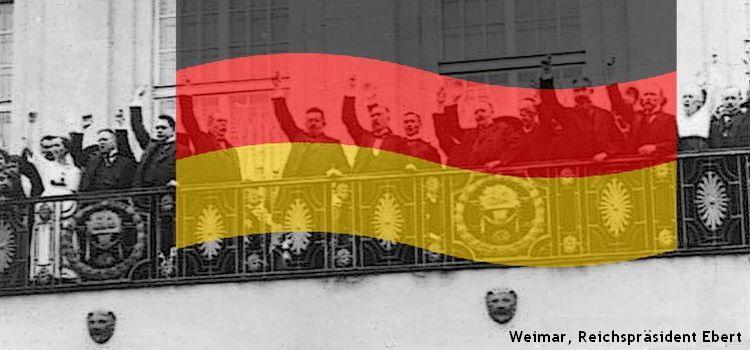
[Germany, 1919] On February 6, 1919, the National Assembly met at the National Theater in Weimar, because fighting continued in Berlin. this venue has given the first German Republic its name.
National Assembly at Weimar
The SPD formed the “Weimar Coalition” with the Center, the Bavarian People’s Party (BVP) and the German Democratic Party (DDP). Friedrich Ebert was elected first Reichspräsident (president). Then the Council of People’s Deputies handed over its authority to the government of Philipp Scheidemann, as the first democratically legitimized government in Germany.
Peace negotiations in Versailles
Meanwhille, the peace conference at Versailles had begun. Representatives of 32 states had come together; the most important among them were U.S. President Wilson, British Prime Minister David Lloyd George and French Prime Minister Georges Clemenceau. The German delegation, however, was not admitted to the negotiations. At the same time, the victors held another peace conference with Austria-Hungary, Bulgaria and the Ottoman Empire.
Draft treaty
Finally, on May 7, 1919, the victors presented the German delegation with the draft treaty. Article 231 assigned to Germany the sole guilt of the war and the responsibility for all the damages caused. Germany had to cede 1/8 of its territory, including Alsace-Lorraine and all colonies. In addition, it had to drastically reduce its troop strength and pay reparations in an as yet unquantified amount. Moreover, Germany was to extradite the emperor, senior politicians and military officers as war criminals. The areas on the left bank of the Rhine and bridgeheads on the right were to be occupied as a permanently demilitarized zone. When the news reached the National Assembly on the night of May 8, everyone was horrified, as the peace terms exceeded the worst expectations.
Outrage
A few days later, on May 12, the National Assembly met in the auditorium of Humboldt University in Berlin. Chancellor Scheidemann welcomed the members, especially the representatives from the Rhineland, Saarland, East and West Prussia, Silesia, Posen, Memel and Danzig. All these were territories that, according to the will of the victors, would soon no longer be parts of the Germn Reich. The representatives of Alsace-Lorraine had not even been allowed to attend. To great applause from all parties, Scheidemann called the Entente’s conditions a “violent peace” that would be “unacceptable.”
The government made counterproposals; they wanted to sign, but not to acknowledge sole war guilt, nor to hand over the emperor and senior military officers. Telephone calls went back and forth between Weimar and Versailles.
Ultimatum
On June 16, the German delegation was summoned. The Allies issued an ultimatum: either the German Reich sign the treaty within seven days without any reservations, or the war would continue. The Scheidemann cabinet was divided on the issue, consequently it resigned on June 20. On June 21, Gustav Adolf Bauer became Chancellor.
After a passionate discussion in the National Assembly on the following June 22, the majority voted to sign with reservations – no recognition of sole war guilt, no extradition of Germans to the victorious powers. But the Allies’ response followed the night of June 23: the treaty could only be accepted or rejected in its entirety.
The Versailles Peace Treaty is signed
At the meeting of the National Assembly on the following June 23, Reich Chancellor Bauer had to conclude that the government no longer had a choice – it had to sign the treaty. On June 23, 1919, the National Assembly adopted the peace treaty (237 votes to 138, 5 abstentions).
On June 28, 1919, the 26 Allied and Associated Powers, as well as Foreign Minister Müller and Transport Minister Dr. Bell, signed the treaty for the German Reich. It was to come into force on January 10, 1920.
The Weimar constitution
The National Assembly adopted a constitution, which came into force on August 11. It was the freest in the world because it enshrined fundamental rights and knew no extremist edicts or party bans. But it also gave its sworn enemies every right and opportunity. The Reichspräsident, directly elected by the people for seven years, had a very strong position. He appointed and dismissed the Reich Chancellor and ministers, and he could dissolve the Reichstag. Besides, he had supreme command over the Reichswehr, the armed forces.
In addition, under Article 48, he could issue emergency decrees in times of crisis. The Reichstag, elected for four years by universal, equal, direct and secret suffrage, had the mandate to legislate and the budgetary right, and the Reich government was responsible to it. Pure proportional representation applied, and there were referendums or plebiscites at the imperial level. The states were represented in the Reichsrat. For the first time, black-red-gold flew as the national flag.
The black-red-gold flag
On August 11, 1919, Jakob had proudly raised a black-red-gold flag in front of the “Stübchen”. Kathi and Max had insisted on giving the elderly gentleman a hand. Black-red-gold, those were the colors of the democratic revolution of 1848. “This time, black-red-gold will hopefully wave for a long time,” he said almost solemnly.
Among his friends, he was the only one who had been there in 1848/49. Of course, back then he had been a small child, yet he remembered the joy and optimism of those days, as well as the dejection when the revolution failed. As a young man, he had entered the service of the Csabany family. “In the same year, the Hungarians rose against the absolute Habsburg monarchy,” he said, “but the revolution failed, and Csabanys had to go into exile. “Grandma Sophie was also there,” added Kathi, “her brother and her cousin Lorenz helped the Democrats in Bonn. One year later Lorenz had to flee, he went to the USA.”
“Do you think our republic has a chance, Jacob?” asked Max. For all his joy over the first democratic constitution, he was worried. According to what he heared about the National Assembly, only a few parties wholeheartedly supported the republic. The hatred and smear campaigns against democratic members of the government deeply appalled him.
“Stab in the back” legend
At the same time, the Kaiser’s military leaders deliberately spread the rumor that the German army had remained “undefeated in the field” during the war and had had received the fatal “stab in the back” from strikes and revolution. “Those damned liars,” Max scolded, “they are turning the facts upside down and get away with it” “I’m with you on that, Max,” Jacob said sadly. “They just don’t want to believe that the shining empire is a thing of the past. And that and that peace is being forced upon us. It is more than a defeat, it is a disgrace that they cannot bear. This cannot be due to their own faults, they need another scapegoat. I’m afraid that the democratic parties considerably underestimate the impact of this stab-in-the-back-lie, and I fear for Erzberger’s life.”
Then Max said goodbye for that day. Kathi and Jacob waved after him. “A fine young man, your Lieutenant Max Schmieder,” Jacob said, all smiles. Kath flushed. “Yes, he is,” she said happily, “we want to get married.”
References
The photo is from the German Wikipedia. Das folgende Bild stammt aus der freien Enzyklopädie Wikipedia und steht unter der Creative Commons Lizenz 3.0. Es wurde im Rahmen einer Kooperation zwischen dem Bundesarchiv und Wikimedia Deutschland aus dem Bundesarchiv für Wikimedia Commons zur Verfügung gestellt: Weimar, Vereidigung Eberts, 1919. Bundesarchiv, Bild 146-1978-042-11 / Sennecke, Robert / CC-BY-SA 3.0

Be the first to comment